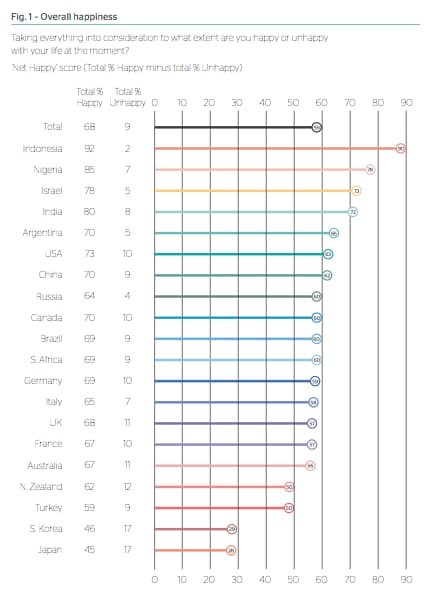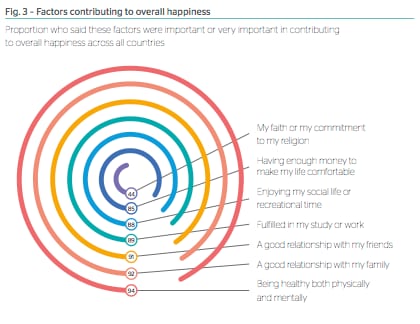Most young people around the world are happy, but the happiest places are not where you'd think

Image: REUTERS/Peter Andrews
Most young people around the world are happy.
Nearly seven out of ten (68%) young people across the world said that they were happy with their lives, but there are wide variations between countries.
Those living in more prosperous countries are actually not as happy as those living in low to middle income countries.
The findings come as a result of a new study, Generation Z: Global Citizenship Survey – What the World’s Young People Think and Feel, which was based on research carried by the Varkey Foundation, a non-profit focused on improving the lives of disadvantaged children through education.

They asked 20,000, 15-21 year-olds, known as 'Generation Z', in 20 countries whether they were happy, what made them happy, and what their thoughts were on a wide range of topics.
The young people who said they were happiest live in developing countries. Indonesia (90%) emerged as the happiest, Nigeria (78%) came in second and India (72%) took third place.
Young people in developed nations were the least happy. France (57%), the UK (57%) Australia (56%) and Japan (28%) ranked well down the happiness scale among the 20 countries surveyed.

The report also found that Generation Z gets less happy as it gets older. Fifty-two per cent of 19-21 year-olds said they were happy as opposed to 68% of 15 to 16 year-olds.
There’s also a gender imbalance. Young women were less likely to say they were happy (56%) than young men (62%).

Can you measure happiness?
The survey asked respondents to answer the question: “Taking everything into consideration to what extent are you happy or unhappy with your life at the moment?” And their answers could range between 1. Very happy and 5. Very unhappy.
But happiness is a subjective measure, and it's difficult to record consistently across different cultures. Some psychologists have questioned the accuracy of this method, given that our view of our lives can be transient and highly subjective.
Happiness can be influenced by genetics, personality and even luck. Measuring happiness is a relatively young discipline and, clearly, is far from perfect.
That said, the report then goes on to ask young people what factors were the most important to their happiness.
What makes them happy?
The least important factor to young people was their faith or commitment to religion, less than half (44%) said this was important to their happiness.
The most important was being healthy, both physically and mentally, with 84% saying their health was the most valuable asset they had.

The other top-scoring factor was having good relationships with friends (91%) and family (92%), and being fulfilled in study or at work (89%). Money was also important (85%).
As you might expect, there were variations in the priorities of young people in different countries.
Commitment to religious beliefs was much more important in Indonesia (93%) and Nigeria (86%), for instance, than it was in Japan (9%) or France (18%).
Having enough money was more important to South Koreans (90%) than it was to Argentinians (73%).

The biggest worry is extremism (83%) and the rise of global terrorism, closely followed by conflict and war (81%).
Generation Z has faith in the power of education with 80% saying it is a source of hope. It's no surprise then that the third biggest concern (69%) is the continued lack of access to education for children.
Climate change (66%) is another significant worry as is the risk of a global pandemic (62%)
Although the older generations worry about exposure to the internet and social media, the pace of technological change is of less concern to Generation Z. Only 30% said this was a worry.

Mapping a career path for Generation Z
When they were asked what was important in their current or future careers, young people globally said that developing skills was the most important factor (24%).
Pay came a close second (23%) followed by career progression (19%). Working for an organisation that makes a positive impact on the world was much less important to them (13%).
Becoming a celebrity and being famous was the least important, only 3% considered it a priority.

Global citizens
Generation Z, young people born between 1995 and 2001, are the first digital natives. For them the internet has been ever present. The first DVDs were released around the time of their birth. Facebook and the iPhone were launched when they were toddlers. Members of Generation Z are the first people who are likely to live to see the 22nd century.
The report argues that this is the first real generation of global citizens, and perhaps they would agree.
In the World Economic Global Shapers Survey, which looks at the opinions of 18-35 year olds, the majority felt that they were global citizens above all else.

Indeed, in the Varkey Foundation Survey more than two-thirds of young people (67%) globally think that making a wider contribution to society beyond themselves and their family is important.
Vikas Pota, the CEO of the Varkey Foundation believes the world will be in safe hands as Generation Z grows up and moves into leadership roles. Speaking on the publication of the report he said, “it is reassuring to know that in the minds of young people, global citizenship is not dead: it could just be getting started.
“At a time of nationalist and populist movements that focus on the differences between people, the evidence shows that young people – whatever their nationality or religion – share a strikingly similar view of the world."
Don't miss any update on this topic
Create a free account and access your personalized content collection with our latest publications and analyses.
License and Republishing
World Economic Forum articles may be republished in accordance with the Creative Commons Attribution-NonCommercial-NoDerivatives 4.0 International Public License, and in accordance with our Terms of Use.
The views expressed in this article are those of the author alone and not the World Economic Forum.
The Agenda Weekly
A weekly update of the most important issues driving the global agenda
You can unsubscribe at any time using the link in our emails. For more details, review our privacy policy.
